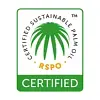
RSPO Principles and Criteria (P&C)
About (RSPO Principles and Criteria (P&C))
The RSPO Principles and Criteria (P&C) are a set of stringent standards established by the Roundtable on Sustainable Palm Oil (RSPO) to ensure the sustainable production of palm oil. These principles and criteria are designed to address the environmental, social, and economic impacts of palm oil production, promoting responsible practices throughout the supply chain.
Key Features of RSPO Principles and Criteria
-
Environmental Responsibility:
- Conservation of Natural Resources and Biodiversity: Ensures that palm oil production does not lead to deforestation or the destruction of natural habitats. Producers must protect high conservation value areas and implement measures to conserve biodiversity.
- Greenhouse Gas Emissions: Requires the monitoring and reduction of greenhouse gas emissions from palm oil production and processing activities.
-
Social Responsibility:
- Fair Labor Practices: Promotes fair treatment of workers, including fair wages, safe working conditions, and respect for workers' rights. Child labor and forced labor are strictly prohibited.
- Community Engagement and Rights: Ensures that the rights of local communities and indigenous peoples are respected. This includes obtaining free, prior, and informed consent (FPIC) before any new developments.
-
Economic Viability:
- Sustainable Development: Encourages practices that are economically viable for producers while ensuring long-term sustainability. This includes efficient use of resources and continuous improvement in production practices.
-
Transparency and Accountability:
- Traceability: Requires that all palm oil products can be traced back to their source, ensuring transparency in the supply chain.
- Certification and Audits: Producers must undergo regular audits by accredited certification bodies to verify compliance with the RSPO P&C.
Benefits of RSPO Principles and Criteria
- Environmental Protection: Helps protect forests, wildlife, and ecosystems by promoting sustainable land use and conservation practices.
- Social Equity: Ensures fair treatment of workers and respects the rights of local communities and indigenous peoples.
- Market Access: Provides access to markets that demand sustainably produced palm oil, enhancing the reputation of certified producers.
- Consumer Trust: Builds consumer confidence by ensuring that palm oil products are produced responsibly and sustainably.
Conclusion
The RSPO Principles and Criteria are essential for promoting sustainable palm oil production. By adhering to these standards, producers can ensure that their practices are environmentally sound, socially responsible, and economically viable. This contributes to the overall goal of making palm oil production more sustainable and reducing its negative impacts on the environment and society.